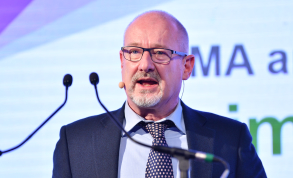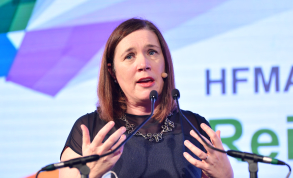HFMA 2021: finance staff can be digital catalysts
The Health Education England director of innovation, digital and transformation said the challenge for finance staff was to understand the long-term need for digital and technology services, and how technology will make a big difference to their organisation.
Finance staff can move the digital agenda forward. ‘As a community, you have the closest relationships with clinicians outside of operational managers. Clinicians look to the finance community to get things through, and your understanding is critical.
‘You are like yeast in bread making, and without yeast the bread is not going to rise. It’s not going to work unless you act as a catalyst, but you need to understand what you’re doing to make it work, to help get the business cases through.’
Finance staff can help with benefits realisation. ‘What are you trying to achieve? It can’t be just about money; it has to be about waste reduction in its widest sense.’
However, boards must take responsibility for driving forward their digital strategy – it should not be left to the chief information officer alone.
The conference also heard from Lisa Hollins (pictured), NHSX director of innovation, who gave examples of the impact of digital transformation. In the Mid and South Essex, for example, a programme to help older people remain in care homes and out of hospital (Whzan), produced reported cost savings of £3.8m through the avoidance of emergency admissions.
Care homes with the programme saw a 10% drop in A&E activity and an 8% reduction in emergency admissions. In those without Whzan, the equivalent falls were 7% and 2%, respectively.
James Teo, clinical director of data science and AI, and professor of neurology, at King’s College Hospital NHS Foundation Trust and Guys and St Thomas NHS Foundation Trust, spoke of the trusts’ journey in taking the huge amount of data collected into something that is useable. This involved standardising the data, cleaning it using open source programming, and searching for natural language processing.
Running data through its system identified common words that may be written in free text by clinicians that mapped to the care given to patients. This identified mismatches in coding. Junior doctors have volunteered to ‘mark’ the AI’s work, training the artificial intelligence to recognise common phrases more accurately, and move to a ‘human-lite’ data processing pipeline.
Ms Hollins advised delegates to explore how technology could reduce workforce costs. She said a flat financial settlement in real terms meant that technology had to pay for itself. ‘That means we can’t increase costs,’ she said. ‘So we know we have to buy some kit, but there will be some efficiencies in terms of staff time.’ She called on finance managers to ‘figure out the financial sustainability’ and look at the potential to reduce workforce costs over the long-term.
Related content
We are excited to bring you a fun packed Eastern Branch Conference in 2025 over three days.
This event is for those that will benefit from an overview of costing in the NHS or those new to costing and will cover why we cost and the processes.